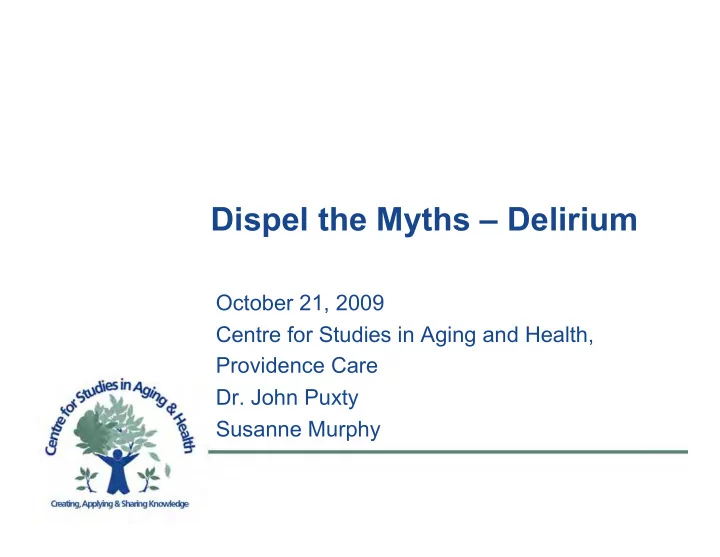

Dispel the Myths – Delirium October 21, 2009 Centre for Studies in Aging and Health, Providence Care Dr. John Puxty Susanne Murphy
Definition “ Delirium is a disturbance of consciousness with reduced ability to focus, sustain, or shift attention . It is a change in cognition that occurs over a short period of time and tends to fluctuate over the course of the day. ” (Milisen et al. 2001).
Delirium � Latin translation: § to be “ crazy ” or to “ rave ”
Personal Experiences � The individual with the delirium might feel: § trapped, in turmoil and/or distressed � Caregivers and family might feel: § confused, helpless, distressed, frustrated and/or embarrassed
Key Features � Change in level of alertness: § drowsiness § agitation § poor attention span § wandering § disrupted sleep cycles § easy distractibility � Possible disorientation, memory deficits and hallucinations � “ Picking ” at clothing or non-existent objects � It is not always easy to diagnose and/or treat. There may be multiple causes and treatment may not always work the way we hope.
Delirium is a Medical Condition
Its common! � It is estimated that when people come into hospital, 10 - 18% of them are delirious and can rise to 20 - 40% during hospital stay � Delirium has been found in 40% of individuals admitted to intensive care units � Deliriums are common after a surgery � As many as 80% of individuals will develop delirium as they near end-of-life
Risk Factors for Delirium � Dementia � Presence of other limitations or illnesses (e.g. vision, hearing, severe illness and/or difficulties in thinking or memory) � Dependence in activities of daily living � History of depression � Use of some medications
Why do People get Delirium? � A whole bunch of reasons!
Some of the Reasons… � Infection � Withdrawal (benzodiazepines/alcohol) � Acute metabolic changes (blood sugar/fluids / electrolytes) � Trauma (pain) � Not enough oxygen in the blood (hypoxia) � Problems with endocrine system (regulation system of the body) � Problems with blood flow � Toxins/drugs � Exposure to heavy metals (mercury, cadmium, lead, arsenic and aluminum)
The most common Reasons… � Drugs, drugs, drugs, drugs: § prescription, over the counter or over the fence, illegal drugs, alcohol withdrawal � Infections � Metabolic disturbance: § blood sugar, fluids, electrolytes � Systems: § heart, lungs, endocrine � Pain
Poor Prognosis � Mortality rates in hospital: § 10 - 26% for those admitted with delirium § 22 - 76% of those who develop delirium during hospitalization have increased chance of death during the months following discharge) � With or without dementia, an independent predictor of sustained poor cognitive and functional status during the year after medical admission to hospital � Increases the length of stay and likelihood of admission to long-term care facilities � Average increase in cost of care $2,500 per case
Under-Recognition of Delirium � Research tells us that the rate of unrecognized delirium is as high as 66% � Most often delirium is mistaken for: § dementia § depression
So, what does Delirium look like again … acute change in mental status AND inattention with fluctuations PLUS disorganized thinking OR altered level of consciousness
Differentiating Delirium and Dementia
So tt ’ s serious! � Delirium is not something to be taken lightly and requires medical intervention and close monitoring � It can last weeks to month even after discharge from hospital
What can you do as a Caregiver? � Look after yourself first … § get plenty of rest § make sure you are eating § accept support and offers of help � Help to make the environment safe and relaxing for the person with delirium � Provide activities or objects of comfort to the individual � Seek medical advice and ongoing support/ monitoring
The Doctor will want to … � Treat the potential causes of the delirium � Provide education � Make suggestions to you and others about the environment � Review all medications
The Doctor might suggest to … � Minimise medication use and/or avoid some medications � Use sedation (only if severely agitated and restless, and real concern of risk) � Avoid PRN use of medication, if possible � Use of medication to help minimize the symptoms of the delirium
Places to go for more Information RNAO fact sheet on delirium for family members: http://www.rnao.org/bestpractices/PDF/DDD2_Fact_Sheet.pdf The Hospital Elder Life Program (HELP) for individuals interested in learning more about delirium: http://elderlife.med.yale.edu/public/patient-family.php? pageid=01.01.00 Video: http://video.google.ca/videoplay?docid=-7013571520343388295
Recommend
More recommend